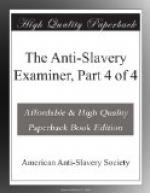There is, however, one point of difference, which arises from the fact that this wrong has been established by law. It becomes a social wrong. The individual, or those who preceded him, may have surrendered their individual right over it to the society. In this case it may happen that the individual cannot act as he might act, if the law had not been made. In this case the evil can only be eradicated by changing the opinions of the society, and inducing them to abolish the law. It will however be apparent that this, as I said before, does not change the relation of the parties either to each other or to God. The wrong exists as before. The individual act is wrong. The law which protects it is wrong. The whole society, in putting the law into execution, is wrong. Before only the individual, now, the whole society, becomes the wrong doer, and for that wrong, both the individuals and the society are held responsible in the sight of God.”
If such “individual act is wrong,” the man who knowingly does it is surely a sinner. Does God, through society, require men to sin?
OBJECTION IX.
If not being non-resistants, we concede to mankind the right to frame Governments, which must, from the very nature of man, be more or less evil, the right or duty to support them, when framed, necessarily follows.
ANSWER. I do not think it follows at all. Mankind, that is, any number of them, have a right to set up such forms of worship as they see fit, but when they have done so, does it necessarily follow that I am in duty bound to support any one of them, whether I approve it or not? Government is precisely like any other voluntary association of individuals—a temperance or anti-slavery society, a bank or railroad corporation. I join it, or not, as duty dictates. If a temperance society exists in the village where I am, that love for my race which bids me seek its highest good, commands me to join it. So if a Government is formed in the land where I live, the same feeling bids me to support it, if I innocently can. This is the whole length of my duty to Government. From the necessity of the case, and that constitution




